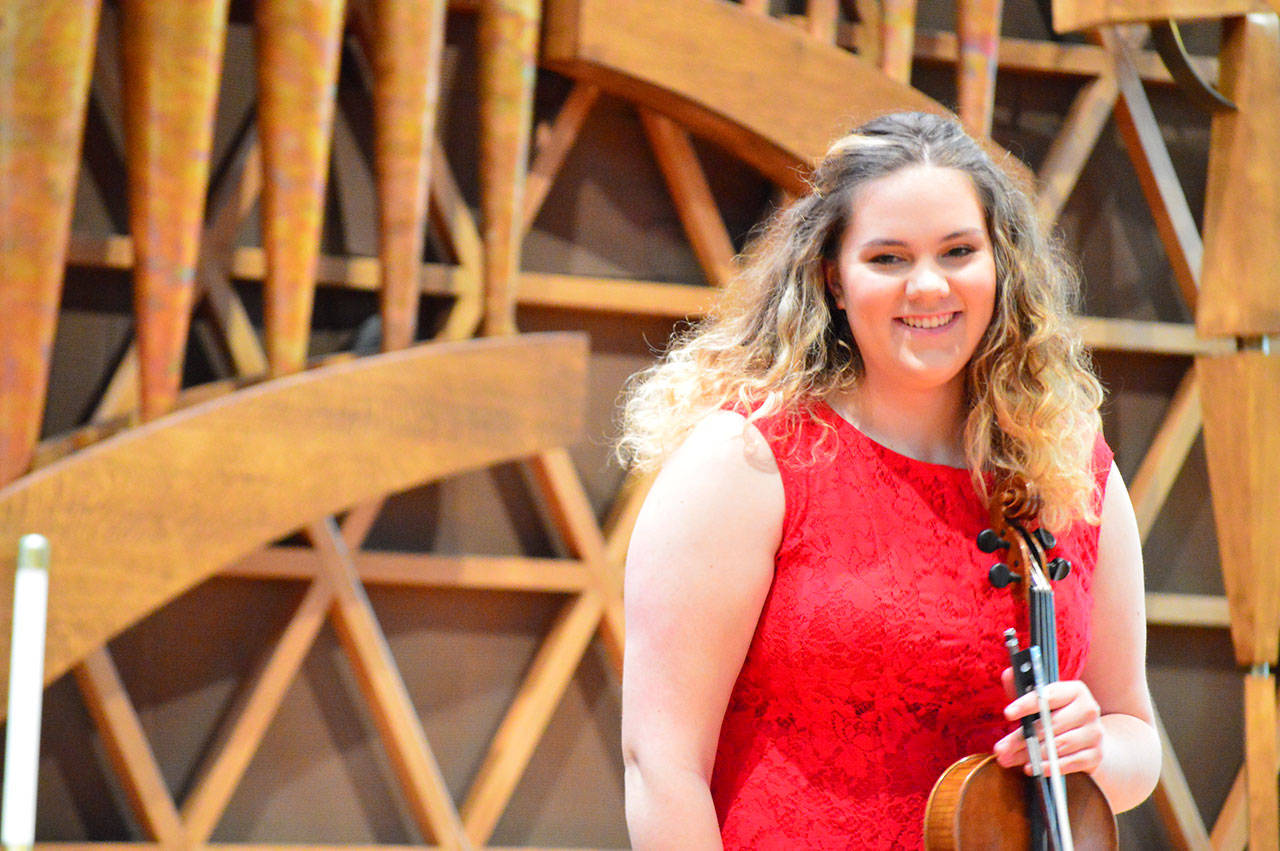PORT ANGELES — Seventy local musicians — plus one former local who now lives in Europe — will get together this Saturday to create something old and new.
The Port Angeles Symphony Orchestra, led by conductor Jonathan Pasternack, is poised to play Berlioz’ Hungarian March from “Faust,” as well as the Symphony No. 3 by Johannes Brahms, “the composer who is closest to my soul,” said Pasternack.
The Third Symphony is a centerpiece of the concert at the Port Angeles High School Performing Arts Center, 304 E. Park Ave.; as a prelude, Pasternack will give a short talk at 6:40 p.m., and the orchestra will play at 7:30. Tickets range from $12 to $30.
Music lovers can also attend the final rehearsal, which starts at the same venue at 10 a.m. Admission to this working rehearsal is $5, or $10 per family (see box).
There’s another centerpiece here: Bela Bartok’s Concerto for Viola starring Cheryl Landry Swoboda, the 1987 Port Angeles High School graduate who has gone on to an international career.
She’s violist with the Southwest German Chamber Orchestra, and has a touring schedule that includes Northern Ireland, Sweden and Finland this spring.
First, she’ll return home, to the place where she “figured out what I wanted to do with my life.”
Swoboda was 13 when she took up the viola, and was fortunate, she said, to have as her mentors Phil and Deborah Morgan-Ellis, longtime music teachers in Port Angeles and Sequim.
These were people who “showed me the sky was the limit,” she said, “and I could do anything I truly believe in.”
When she joins the Port Angeles Symphony for rehearsals and concert this week, Swoboda will play alongside its violists: Phil Morgan-Ellis, Tyrone Beatty, Karen Hart, Jesse Major, Meghan Stinard and Lauren Waldron.
Waldron, a senior at Port Angeles High, took first place in the North Olympic Peninsula-wide Young Artist Competition, hosted by the Port Angeles Symphony, earlier this year. And she has just won the National Federation of Music Clubs’ Wendell Irish Viola Award, and has plans to pursue a music degree — at one of the five universities to which she’s been accepted.
“Lauren has everything it takes to make it in the music profession,” said Pasternack. James Ray, the orchestra director at the high school, has called Waldron “not just a good viola player, but an artist.”
Swoboda, for her part, remembers how it was to grow up as a musician here.
“I’ve lived with this Bartok concerto since I was 17, when I first began learning it,” she said. “I feel at home in this music. [It’s] full of melody and wonderful harmony; the final movement even has a Romanian folk-music tune in it.
“There’s something about it, playing it in Port Angeles, about coming full circle …”
Not that the concerto is a stroll in the park. Though Swoboda has probably spent more time with the piece than any other in her repertoire, Saturday will be only the second time she gives a formal performance of it.
“When I have an important performance date on my horizon, I get uneasy many months in advance, in this case since October,” she admitted.
Yet Swoboda has learned too how to proceed.
“One of my most important mantras when I am nervous before going on stage is: If I am in the music and concentrating exclusively on what I have to do, then there is no room left for nervousness,” she said.
“I’m completely wrapped up in painting emotions and presenting the music, inter-reacting, communicating with my fellow musicians. For me, there is no room for ego.”
“When I go on stage, I want to open my soul and hope that it reaches my audience. I want to share, what has moved me and hope somebody else is also moved.”
Pasternack is also well-acquainted with Bartok’s intensity. The composer “went his own way. He didn’t follow anyone else’s rules,” the conductor said, adding that this music has innovations that still sound new today.
Bartok is “very close to my heart,” he said. Pasternack, who earned his master’s and doctorate degrees at the University of Washington, studied under the late Peter Erös, another Bartok devotee.
“I feel a certain kinship” with this music, said Pasternack.
He also feels the naturalness of pairing Bartok with Brahms. Both men wrote music that is full of beauty — and that presents a steep challenge to the people in the orchestra.
Brahms’ Third Symphony will “take every ounce of musicianship we can give it, and still ask for more,” Pasternack said.
But the orchestra is rising to meet the moment, he said. Rehearsals have him exhilarated. “The way the musicians are taking to the music, said Pasternack, is “really gratifying.”
The maestro couldn’t resist adding one more thing about the Third Symphony.
“It has a certain energy … a warmth and almost bittersweet quality,” captivating both the mind and the heart of musician and listener.
“It’s just gorgeous music, and for me it’s just the top of its class.”


